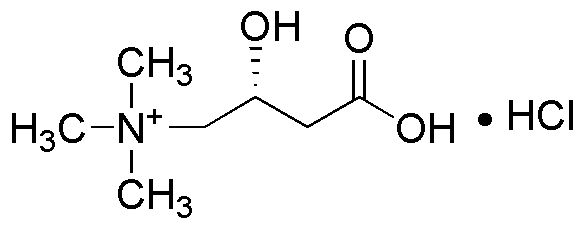L-Carnitine hydrochloride is widely utilized in research focused on:
- Sports Nutrition: Often used as a dietary supplement to enhance athletic performance by improving energy metabolism and reducing fatigue during exercise.
- Weight Management: Commonly included in weight loss products due to its role in fat oxidation, helping individuals manage their weight more effectively.
- Cardiovascular Health: Investigated for its potential benefits in heart health, as it may aid in reducing triglyceride levels and improving overall heart function.
- Neurological Research: Studied for its neuroprotective properties, showing promise in conditions like Alzheimer's disease and other cognitive disorders.
- Infant Nutrition: Used in specialized infant formulas to support healthy growth and development, particularly for premature infants or those with metabolic disorders.
General Information
Properties
Safety and Regulations
Applications
L-Carnitine hydrochloride is widely utilized in research focused on:
- Sports Nutrition: Often used as a dietary supplement to enhance athletic performance by improving energy metabolism and reducing fatigue during exercise.
- Weight Management: Commonly included in weight loss products due to its role in fat oxidation, helping individuals manage their weight more effectively.
- Cardiovascular Health: Investigated for its potential benefits in heart health, as it may aid in reducing triglyceride levels and improving overall heart function.
- Neurological Research: Studied for its neuroprotective properties, showing promise in conditions like Alzheimer's disease and other cognitive disorders.
- Infant Nutrition: Used in specialized infant formulas to support healthy growth and development, particularly for premature infants or those with metabolic disorders.
Documents
Safety Data Sheets (SDS)
The SDS provides comprehensive safety information on handling, storage, and disposal of the product.
Product Specification (PS)
The PS provides a comprehensive breakdown of the product’s properties, including chemical composition, physical state, purity, and storage requirements. It also details acceptable quality ranges and the product's intended applications.
Certificates of Analysis (COA)
Search for Certificates of Analysis (COA) by entering the products Lot Number. Lot and Batch Numbers can be found on a product’s label following the words ‘Lot’ or ‘Batch’.
*Catalog Number
*Lot Number
Certificates Of Origin (COO)
This COO confirms the country where the product was manufactured, and also details the materials and components used in it and whether it is derived from natural, synthetic, or other specific sources. This certificate may be required for customs, trade, and regulatory compliance.
*Catalog Number
*Lot Number
Safety Data Sheets (SDS)
The SDS provides comprehensive safety information on handling, storage, and disposal of the product.
DownloadProduct Specification (PS)
The PS provides a comprehensive breakdown of the product’s properties, including chemical composition, physical state, purity, and storage requirements. It also details acceptable quality ranges and the product's intended applications.
DownloadCertificates of Analysis (COA)
Search for Certificates of Analysis (COA) by entering the products Lot Number. Lot and Batch Numbers can be found on a product’s label following the words ‘Lot’ or ‘Batch’.
*Catalog Number
*Lot Number
Certificates Of Origin (COO)
This COO confirms the country where the product was manufactured, and also details the materials and components used in it and whether it is derived from natural, synthetic, or other specific sources. This certificate may be required for customs, trade, and regulatory compliance.

